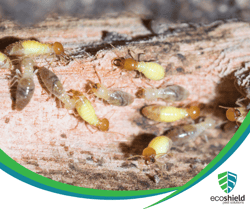 As homeowners, we invest time and effort into creating a safe haven for our families, but these tiny yet destructive pests can jeopardize the very foundation we've built. In this blog post, we'll explore essential strategies for termite prevention that every homeowner should know, from regular inspections to proactive measures. While some preventive methods can be implemented independently, there are instances when it's crucial to call in the professionals. We'll delve into the signs that indicate a professional touch is needed and why entrusting the task to experts can be the most effective safeguard for your home. Join us as we navigate the realm of termite prevention, empowering you to protect your home and make informed decisions about when to take matters into your own hands and when to seek professional assistance.
As homeowners, we invest time and effort into creating a safe haven for our families, but these tiny yet destructive pests can jeopardize the very foundation we've built. In this blog post, we'll explore essential strategies for termite prevention that every homeowner should know, from regular inspections to proactive measures. While some preventive methods can be implemented independently, there are instances when it's crucial to call in the professionals. We'll delve into the signs that indicate a professional touch is needed and why entrusting the task to experts can be the most effective safeguard for your home. Join us as we navigate the realm of termite prevention, empowering you to protect your home and make informed decisions about when to take matters into your own hands and when to seek professional assistance.
Why is termite prevention in my home important?
Termite prevention in homes is paramount, as these tiny pests pose a significant threat to the structural integrity of our homes. Unlike other household pests, termites work quietly and discreetly, often causing extensive damage before their presence is even detected. One of the primary reasons to prioritize termite prevention is the potential financial burden associated with repairs. Termites have an insatiable appetite for cellulose found in wood, and if left unchecked, they can compromise the structural components of a home, leading to costly renovations and repairs.
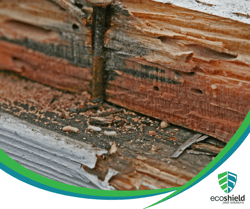 Beyond the financial aspect, termite prevention is crucial for safeguarding the sentimental and emotional value of a home. Homes are not just physical structures; they hold memories, provide comfort, and serve as the backdrop to life's most significant moments. Termites can jeopardize this sense of security and turn a once-sturdy sanctuary into a vulnerable space. By implementing preventive measures, homeowners can preserve the integrity of their homes and ensure that they remain strongholds of comfort and safety for generations to come.
Beyond the financial aspect, termite prevention is crucial for safeguarding the sentimental and emotional value of a home. Homes are not just physical structures; they hold memories, provide comfort, and serve as the backdrop to life's most significant moments. Termites can jeopardize this sense of security and turn a once-sturdy sanctuary into a vulnerable space. By implementing preventive measures, homeowners can preserve the integrity of their homes and ensure that they remain strongholds of comfort and safety for generations to come.
Moreover, termite prevention aligns with ecological and environmental responsibility. The use of chemical treatments for termite control can have unfavorable effects on the environment, making preventive measures an eco-friendly alternative. Sustainable practices such as regular inspections, proper drainage maintenance, and using termite-resistant materials during construction contribute to a healthier balance between human habitats and nature.
In essence, termite prevention is not merely about protecting a physical structure; it's about securing the very essence of what makes a house a home. It is a proactive approach that reflects a homeowner's commitment to the well-being of their living space, ensuring it remains a haven untouched by the destructive forces of these silent invaders. By prioritizing termite prevention, homeowners can enjoy peace of mind, knowing that their investment is shielded, both financially and emotionally, from the threat of termite damage.
Can I DIY Termite Prevention?
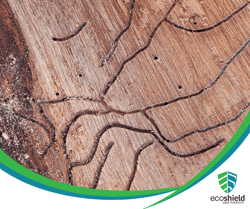 Embarking on do-it-yourself (DIY) termite prevention endeavors as a homeowner is certainly possible, but success hinges on a combination of vigilance, commitment, and understanding the nuances of termite behavior. Regular inspections constitute the first line of defense, as homeowners should thoroughly examine their property for signs of termite activity. This includes inspecting wooden structures, crawl spaces, and the perimeter of the home. Sealing any cracks or crevices in the foundation, walls, and windows can help create a less inviting environment for termites.
Embarking on do-it-yourself (DIY) termite prevention endeavors as a homeowner is certainly possible, but success hinges on a combination of vigilance, commitment, and understanding the nuances of termite behavior. Regular inspections constitute the first line of defense, as homeowners should thoroughly examine their property for signs of termite activity. This includes inspecting wooden structures, crawl spaces, and the perimeter of the home. Sealing any cracks or crevices in the foundation, walls, and windows can help create a less inviting environment for termites.
In addition to inspections and sealing entry points, moisture control is a key aspect of DIY termite prevention. Termites thrive in damp environments, so addressing water leaks, improving ventilation, and ensuring proper drainage around the home are essential steps. Implementing physical barriers, such as installing metal mesh or sand barriers, can deter termite access to the structure. Furthermore, using termite-resistant materials during construction or renovations adds an extra layer of protection.
However, while these measures can contribute significantly to termite prevention, it's crucial to acknowledge the limitations of a DIY approach. Professional termite inspections conducted by licensed pest control experts possess the advantage of specialized knowledge and equipment. Termites are notorious for their ability to infiltrate concealed areas, and professionals are adept at detecting subtle signs of infestation that may escape the untrained eye. In cases where termite activity is confirmed, the precision and potency of professional-grade treatments become paramount, ensuring the complete eradication of the infestation and preventing future occurrences.
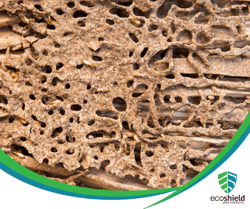 In conclusion, DIY termite prevention is a commendable and viable undertaking for homeowners willing to invest time and effort. However, recognizing the boundaries of individual expertise and seeking professional assistance when needed can ultimately fortify a home against the persistent threat of termites. Balancing proactive measures with the expertise of professionals ensures a comprehensive and effective defense strategy, securing the long-term integrity of the home.
In conclusion, DIY termite prevention is a commendable and viable undertaking for homeowners willing to invest time and effort. However, recognizing the boundaries of individual expertise and seeking professional assistance when needed can ultimately fortify a home against the persistent threat of termites. Balancing proactive measures with the expertise of professionals ensures a comprehensive and effective defense strategy, securing the long-term integrity of the home.
How can I prevent termites as a homeowner?
Protecting your home from termite infestations requires a combination of proactive measures and vigilant maintenance. One fundamental step in termite prevention is regular inspections. Schedule routine checks of your property, focusing on areas where termites are most likely to thrive, such as wooden structures, crawl spaces, and the foundation. Look for mud tubes, tiny holes in wood, or discarded wings, as these can be telltale signs of termite activity. Keeping your home well-ventilated is another key aspect of prevention, as termites thrive in damp environments. Ensure proper ventilation in attics, basements, and crawl spaces, and promptly fix any leaks or drainage issues.
Moisture control is crucial in termite prevention. Repair any plumbing leaks promptly, and make sure your home's exterior grading slopes away from the foundation to prevent water accumulation. Investing in a good drainage system around your property can also be beneficial. Additionally, consider using moisture barriers in crawl spaces to create a dry environment that discourages termite activity.
Wood-to-soil contact is an open invitation for termites. Take steps to minimize this contact by keeping wooden structures, such as decks and fences, at least a few inches above the ground. Use termite-resistant materials for construction when possible, and treat exposed wood with termite-resistant chemicals. Regularly inspect and, if necessary, replace damaged or decaying wood around your home.
When it comes to landscaping, maintain a buffer zone between your home and any mulch or soil. Mulch provides an attractive nesting ground for termites, so keep it at least 15 inches away from your foundation. Similarly, ensure that plants and trees are not in direct contact with your home's structure.
While these preventive measures significantly reduce the risk of termite infestations, it's important to note that professional assistance may be necessary, especially in high-risk areas or if signs of termite activity are detected. Professional pest control services have the expertise and tools to conduct thorough inspections, implement targeted treatments, and provide ongoing monitoring to safeguard your home effectively. Regular communication with pest control professionals can help tailor a termite prevention plan that suits the unique characteristics of your property, providing peace of mind for homeowners concerned about the threat of these persistent pests.
When should I call the professionals for termite prevention?
While homeowners can take proactive measures to prevent termite infestations, there are specific situations where calling in professionals becomes imperative. First and foremost, if you notice any signs of an existing termite infestation, such as discarded wings, mud tubes, or damaged wood, it's crucial to bring in the experts immediately. Termites work silently and swiftly, often causing significant damage before their presence becomes noticeable. Professional pest control services have the experience and knowledge to assess the extent of the infestation and employ targeted treatments to eradicate the termites effectively.
Another scenario that warrants professional intervention is when the structure of your home is at risk. Termites can compromise the structural integrity of a building by feeding on its wooden components, including beams and support structures. If you observe sagging floors, hollow-sounding wood, or visible structural damage, it's time to call in professionals to conduct a thorough inspection and implement appropriate measures to stabilize and repair the affected areas.
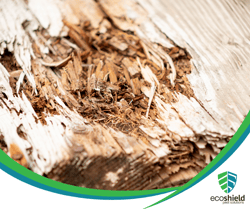 Homeowners should also consider professional assistance when dealing with persistent or recurring termite problems. DIY solutions may provide temporary relief, but they likely won't address the root cause of the infestation. Pest control experts can conduct a comprehensive analysis of your property, identify conducive conditions that attract termites, and implement long-term preventive measures to reduce the risk of future infestations.
Homeowners should also consider professional assistance when dealing with persistent or recurring termite problems. DIY solutions may provide temporary relief, but they likely won't address the root cause of the infestation. Pest control experts can conduct a comprehensive analysis of your property, identify conducive conditions that attract termites, and implement long-term preventive measures to reduce the risk of future infestations.
Lastly, for those who value proactive termite prevention, scheduling regular professional inspections is a wise investment. Certified pest control professionals possess the expertise to detect early signs of termite activity that might go unnoticed by untrained eyes. Regular inspections can help homeowners stay ahead of potential infestations and implement preventive treatments before termites gain a foothold.
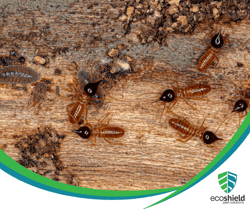 In essence, while there are effective DIY methods for termite prevention, calling in professionals is essential in the presence of an existing infestation, when structural damage is evident, in cases of persistent problems, or as part of a proactive strategy to safeguard your home in the long term. The expertise of professionals ensures a thorough and targeted approach, providing homeowners with peace of mind and a more secure defense against these relentless invaders.
In essence, while there are effective DIY methods for termite prevention, calling in professionals is essential in the presence of an existing infestation, when structural damage is evident, in cases of persistent problems, or as part of a proactive strategy to safeguard your home in the long term. The expertise of professionals ensures a thorough and targeted approach, providing homeowners with peace of mind and a more secure defense against these relentless invaders.
Can EcoShield Pest Solutions help me prevent and treat termites in my home?
Absolutely!
Time is of the essence when dealing with termites; delays in receiving treatment can result in more damage caused and more money required. With the Shield Termite Program, EcoShield offers year-round protection against termites and catches any potential termite activity before it becomes a headache.
A thorough inspection of your home will allow EcoShield pest technicians to identify problem areas and target them for treatment. EcoShield’s proven termite removal strategy ensures the entire colony is treated through the use of dependable products and with the informed knowledge of a termite’s habits, life cycle, and biology. Termite monitors will be installed every 15 feet to detect termite activity before it becomes catastrophic to your home and wallet.
If you’re experiencing a problem with termites in your home or would like to prevent termite damage in the future, call EcoShield today for a free, no-obligation quote!